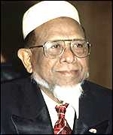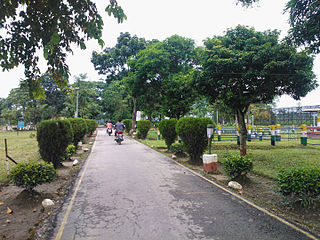
Barisal Division is one of the eight administrative divisions of Bangladesh. Located in the south-central part of the country, it has an area of 13,225 km2 (5,106 sq mi), and a population of 9,325,820 at the 2022 Census. It is the least populous Division in Bangladesh. It is bounded by Dhaka Division on the north, the Bay of Bengal on the south, Chittagong Division on the east and Khulna Division on the west. The administrative capital, Barisal city, lies in the Padma River delta on an offshoot of the Arial Khan River. Barisal division is criss-crossed by numerous rivers that earned it the nickname Dhan-Nodi-Khal, Ei tin-e Borishal.

Nurul Amin was a Pakistani politician and jurist who served as the eighth prime minister of Pakistan from 7 December to 20 December 1971. His term of only 13 days as prime minister was the shortest served in Pakistani parliamentary history. He was also the only Vice President of Pakistan.

Abdus Samad Azad was a Bangladeshi diplomat and politician. He was elected to Bangladesh's parliament five times from 1970 to 2001. He was also elected Member of Lower Assembly in the Parliament of the then East Pakistan. He became President of the Muslim Student Federation of All - Asam in 1946 and led the Language Movement in 1952.

Kamal Hossain, better known as Dr. Kamal, is a founding leader, lawyer and politician of Bangladesh. He is known as the "Father of the Bangladeshi Constitution" and regarded as an icon of secular democracy in the Indian subcontinent. Hossain currently heads his own law firm in Dhaka. He retired from political activities and from the post of president of Gano Forum in October 2023.

Manikganj is a district in central Bangladesh and part of the Dhaka Division. It was established in 1845, it was a subdivision of Faridpur District until, in 1953, it was transferred to Dhaka District for administrative purposes. In 1984, Manikganj was declared a full district.

Panchagarh is a district of the Rangpur division in Northern Bangladesh. Panchagarh is the northernmost district of Bangladesh. It lies between 26º00' and 26º38' north latitudes and between 88º19' and 88º49' east longitudes. It was established as a district on 1 February 1984.

Maulana Azad College is a public institute of liberal arts, commerce and science in India, located in central Kolkata, West Bengal, India. The college is fully government-administered. It is located near the junction of Rafi Ahmed Kidwai Road and S. N. Banerjee Road, popularly called "Lotus crossing".

Patgram is an upazila of Lalmonirhat District in Rangpur Division, Bangladesh. It had 27 enclaves, most notably Dahagram–Angarpota which is connected to the Bangladeshi mainland through the Tin Bigha Corridor.

Ataur Rahman Khan was a Bangladeshi lawyer, politician and writer, who served as the chief minister of East Pakistan from 1 September 1956 – March 1958, and as the prime minister of Bangladesh from 30 March 1984 to 1 January 1985.

Fazlul Quader Chowdhury was a Bengali politician who served as the 5th speaker of the National Assembly of Pakistan from East Pakistan. He belonged to Ayub Khan's Convention Muslim League. He was also the acting president of Pakistan from time to time when Ayub Khan left the country. His elder brother Fazlul Kabir Chowdhury was the leader of the opposition in East Pakistan assembly. Quader was preceded by Maulvi Tamizuddin Khan of Awami League.
The Krishak Sramik Party was a major anti-feudal political party in the British Indian province of Bengal and later in the Dominion of Pakistan's East Bengal and East Pakistan provinces. It was founded in 1929 as the Nikhil Banga Praja Samiti to represent the interests of tenant farmers in Bengal's landed gentry estates. Sir Abdur Rahim was its first leader. A. K. Fazlul Huq was elected leader in 1935 when the former was appointed as the president of the Central Legislative Assembly of India.

Muhammad Jamiruddin Sarkar is a Bangladeshi lawyer and politician who served as the acting President of Bangladesh in 2002. He served as the Speaker of the Parliament of Bangladesh. He is one of the founding members of the Bangladesh Nationalist Party and was a member of the standing committee, which was the policy making body of the party, from its inception. He also established Barrister Jamiruddin Sircar Collegiate Institute in Panchagarh in 1990.

Mirza Fakhrul Islam Alamgir is a Bangladeshi politician. He has been the secretary general of the Bangladesh Nationalist Party (BNP) since 2016. He was a member of the parliament for Thakurgaon-1 constituency from 2001 to 2006. In that term, he was also appointed as the Minister of State in charge of the Ministry of Agriculture and later Ministry of Civil Aviation and Tourism.

The Constituent Assembly of Bangladesh was the first and, to date, the only constitution-making body of Bangladesh, convened in 1972 by the government of Sheikh Mujibur Rahman following the country's independence. It comprised representatives elected in the national and provincial council elections of Pakistan held in 1970.
Mashiur Rahman (1920–1971) was a Bangladeshi lawyer and politician, a member of the East Bengal Legislative Assembly and cabinet minister in the East Pakistan government of Ataur Rahman Khan. He was instrumental in the founding of the Bangladesh Awami League and in the Bengali Language Movement, and supported Sheikh Mujibur Rahman.
Syed Altaf Hossain was a Bangladeshi politician who was a member of Parliament and Minister of Railway.

The Mazumders of Sylhet, or more specifically, the Mazumders of Gorduar/Barshala, are a notable aristocratic family who have played important roles throughout the history of the Sylhet region.
Fazlur Rahman was a Pakistani Bengali politician and lawyer. He was the first Education Minister of Pakistan and a member of the 1st and 2nd National Assemblies of Pakistan.












